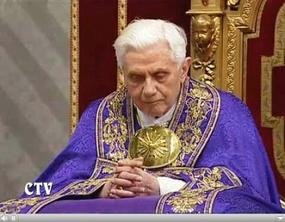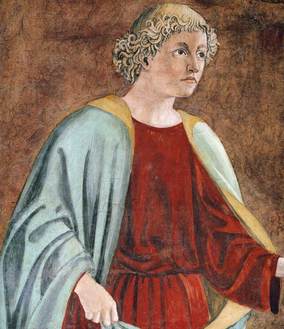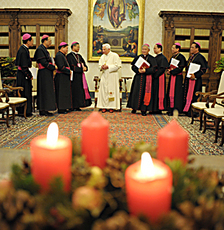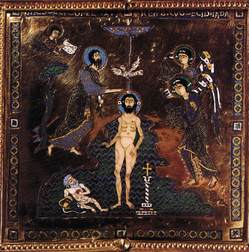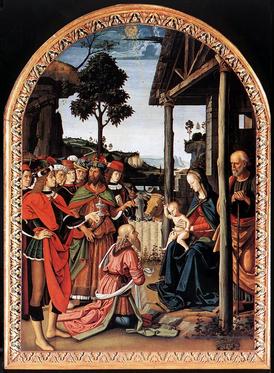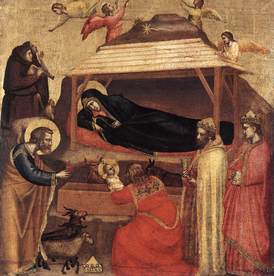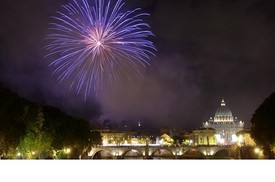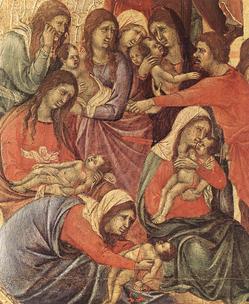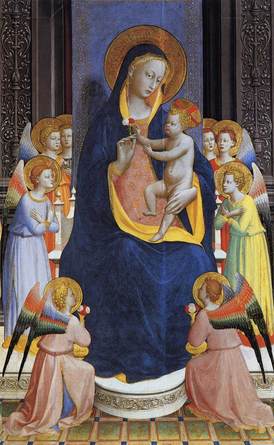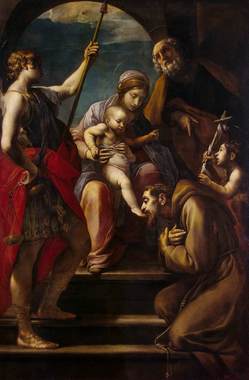The Pope’s homily:
With this evening’s celebration, the Lord gives us the grace and joy of opening the new liturgical year beginning with its first stage: Advent, the period that
commemorates the coming of God among us. Every beginning brings a special grace, because it is blessed by the Lord. In this Advent period we will once again experience the closeness of the One who created the world, who guides history and cared for us to the point of becoming a man. This great and fascinating mystery of God with us, moreover of God who becomes one of us, is what we celebrate in the coming weeks journeying towards holy Christmas. During the season of Advent we feel the Church that takes us by the hand and – in the image of the Blessed Virgin Mary – expresses her motherhood allowing us to experience the joyful expectation of the coming of the Lord, who embraces us all in his love that saves and consoles.
While our hearts reach out towards the annual celebration of the birth of Christ, the Church’s liturgy directs our gaze to the final goal: our encounter with the Lord in the splendour of glory. This is why we, in every Eucharist, “announce his death, proclaim his resurrection until he comes again” we hold vigil in prayer. The liturgy does not cease to encourage and support us, putting on our lips, in the days of Advent, the cry with which the whole Bible concludes, the last page of the Revelation of Saint John: “Come, Lord Jesus “(22:20).
Dear brothers and sisters, our coming together this evening to begin the Advent journey is enriched by another important reason: with the entire Church, we want to solemnly celebrate a prayer vigil for unborn life. I wish to express my thanks to all who have taken up this invitation and those who are specifically dedicated to welcoming and safeguarding human life in different situations of fragility, especially in its early days and in its early stages. The beginning of the liturgical year helps us to relive the expectation of God made flesh in the womb of the Virgin Mary, God who makes himself small, He becomes a child, it speaks to us of the coming of a God who is near, who wanted to experience the life of man, from the very beginning, to save it completely, fully. And so the mystery of the Incarnation of the Lord and the beginning of human life are intimately connected and in harmony with each other within the one saving plan of God, the Lord of life of each and every one of us. The Incarnation reveals to us, with intense light and in an amazing way, that every human life has an incomparable, a most elevated dignity.
Man has an unmistakable originality compared to all other living beings that inhabit the earth. He presents himself as a unique and singular entity, endowed with intelligence and free will, as well as being composed of a material reality. He lives simultaneously and inseparably in the spiritual dimension and the corporal dimension. This is also suggested in the text of the First letter to the Thessalonians which was just proclaimed: “May the God of peace himself – St. Paul writes – make you perfectly holy and may you entirely, spirit, soul, and body, be preserved blameless for the coming of our Lord Jesus Christ “(5:23). Therefore, we are spirit, soul and body. We are part of this world, tied to the possibilities and limits of our material condition, at the same time we are open to an infinite horizon, able to converse with God and to welcome Him in us. We operate in earthly realities and through them we can perceive the presence of God and seek Him, truth, goodness and absolute beauty. We savour fragments of life and happiness and we long for total fulfilment.
God loves us so deeply, totally, without distinction, He calls us to friendship with him, He makes us part of a reality beyond all imagination, thought and word; His own divine life. With emotion and gratitude we acknowledge the value of the incomparable dignity of every human person and the great responsibility we have toward all. ” Christ, the final Adam, – says the Second Vatican Council – by the revelation of the mystery of the Father and His love, fully reveals man to man himself and makes his supreme calling clear…. by His incarnation the Son of God has united Himself in some fashion with every man. “(Gaudium et Spes, 22).
Believing in Jesus Christ also means having a new outlook on man, a look of trust and hope. Moreover, experience itself and reason show that the human being is a subject capable of discernment, self-conscious and free, unique and irreplaceable, the summit of all earthly things, that must be recognized in his innate value and always accepted with respect and love. He has the right not to be treated as an object of possession or something to manipulate at will, not to be reduced to a mere instrument for the benefit of others and their interests. The human person is a good in and of himself and his integral development should always be sought. Love for all, if it is sincere, naturally tends to become a preferential attention to the weakest and poorest. In this vein we find the Church’s concern for the unborn, the most fragile, the most threatened by the selfishness of adults and the darkening of consciences. The Church continually reiterates what was declared by the Second Vatican Council against abortion and all violations of unborn life: “from the moment of its conception life must be guarded with the greatest care ” (ibid., n. 51).
There are cultural tendencies that seek to anesthetize consciences with misleading motivations. With regard to the embryo in the womb, science itself highlights its autonomy capable of interaction with the mother, the coordination of biological processes, the continuity of development, the growing complexity of the organism. This is not an accumulation of biological material, but a new living being, dynamic and wonderfully ordered, a new unique human being. So was Jesus in Mary’s womb, so it was for all of us in our mother’s womb. With the ancient Christian writer Tertullian we can say: “he who will be a man is already one” (Apologeticum IX, 8), there is no reason not to consider him a person from conception.
Unfortunately, even after birth, the lives of children continue to be exposed to abandonment, hunger, poverty, disease, abuse, violence or exploitation. The many violations of their rights that are committed in the world sorely hurt the conscience of every man of good will. Before the sad landscape of the injustices committed against human life, before and after birth, I make mine Pope John Paul II’s passionate appeal to the responsibility of each and every individual: ” respect, protect, love and serve life, every human life! Only in this direction will you find justice, development, true freedom, peace and happiness!” (Evangelium vitae, 5). I urge the protagonists of politics, economic and social communications to do everything in their power to promote a culture which respects human life, to provide favorable conditions and support networks for the reception and development of life.
To the Virgin Mary, who welcomed the Son of God made man with faith, with her maternal womb, with loving care, with nurturing support and vibrant with love, we entrust our commitment and prayer in favour of unborn life . We do in the liturgy – which is the place where we live the truth and where truth lives with us – worshiping the divine Eucharist, we contemplate Christ’s body, that body who took flesh from Mary by the Holy Spirit, and from her was born in Bethlehem for our salvation. Ave, verum Corpus, natum de Maria Virgine!
“Show us, O Lord, Your infinite mercy.”
